Health In Europe
Welcome to the Health In Europe podcast from the World Health Organization Regional Office for Europe. Our Region is broad and diverse. We work with fascinating and driven individuals and groups. This podcast is about hearing their stories and how it might impact your day-to-day life.
Episodes
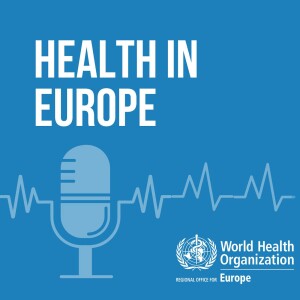
4 days ago
4 days ago
How can we address the intersecting challenges of climate change and non-communicable diseases at once?
In this first episode of the Intersections in Health, a new short podcast mini series, we delve into NCDs and the triple planetary crisis of climate change, biodiversity loss and toxic pollution with
Hans Bruyninckx , Commissioner on the Pan-European Commission on Climate and Health #PECCH, Professor of Environmental Governance at the University of Antwerp, former Executive Director of the European Environment Agency and
Sinaia Netanyahu , Programme Manager at WHO/Europe’s Centre for Environment and Health.
We discuss attacks on science and #misinformation, the art of knowledge translation, communicating complexity and uncertainty, super wicked problems and system transformation. Crucially, we explore what this moment asks of each one of us and collectively.
Tune in and give us your feedback on the issues discussed.
----------
Our next episodes will explore the intersections of NCDs and anti-microbial resistance and NCDs and population ageing.
This short series is part of WHO/Europe’s count-down to the UN High Level Meeting on NCDs in September 2025.
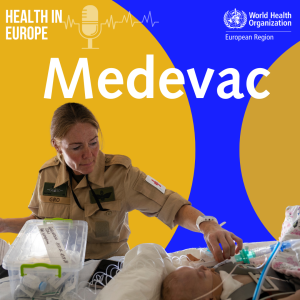
Sunday Mar 16, 2025
Sunday Mar 16, 2025
Crisis and conflict dominate the headlines. The ongoing war in Ukraine and the conflict between Israel and the occupied Palestinian territory have brought death, destruction and displacement. But among the major disasters and conflicts. It's important to look for the stories of the people who are helping.
As we mark over 5,000 medical evacuations from Ukraine, in this episode of Health in Europe, we'll share stories about some of the sick and injured people who have been transported away from war zones and other emergencies, and of their welcome, medical treatment, recovery and eventual repatriation.
We'll also explore the Region's Emergency Medical Teams to learn about people who, with sometimes only hours notice, drop everything to travel to emergency zones. Who are they and what motivates them?
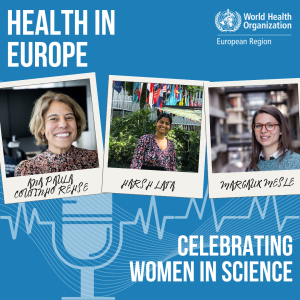
Thursday Mar 06, 2025
Thursday Mar 06, 2025
Stories of strength and dedication to mark International Women’s Day
For International Women’s Day, we celebrate the achievements of three remarkable women working at the forefront of global health. Margaux Mesle, Ana Paula Coutinho Rehse and Harsh Lata work for the WHO Regional Office for Europe’s World Health Emergency programme (WHE) which sits at the centre of global coordination, preparation and response to disease outbreaks and emergencies. Their journeys into science, their challenges, and their advice for future generations are both inspiring and enlightening.
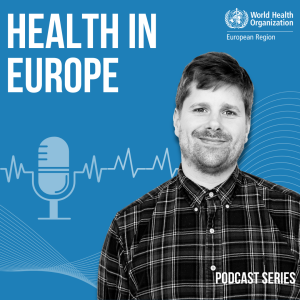
Wednesday Feb 26, 2025
Wednesday Feb 26, 2025
When we hear the word suicide, many of us instinctively recoil. The word is taboo in everyday life. For family members who have lost somebody to suicide, this stigma can make grieving even more complex. People may struggle to explain the loss and how they feel about it to friends, colleagues, and other family members.
But how do you explain suicide to a young child? What words should you use? How do you support them?
In June 2024, Ireland's National Office for Suicide Prevention published an illustrated children's book called Safe Harbour, to help parents and carers talk to children bereaved by suicide.
The book, written by Patricia Ford and illustrated by Bronna Lee, encapsulates much of what suicide bereavement is about, navigating a world that is both completely new and oddly normal. For this episode of Health in Europe, we are looking at suicide bereavement with Safe Harbour as our compass.
DOWNLOAD SAFE HARBOUR: You can download the book and its resources at https://www.childhoodbereavement.ie/safeharbour
PLEASE NOTE:
This episode of Health in Europe covers the theme of suicide and contains an account of suicide bereavement. If you are thinking of ending your life, please reach out to family and friends or to a local suicide helpline. If you are unsure of helplines in your area, please visit: https://findahelpline.com
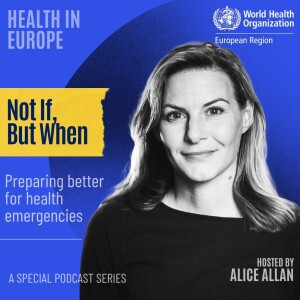
Monday Sep 09, 2024
Monday Sep 09, 2024
In our turbulent world, it’s tempting to move on and forget the difficult days of COVID-19. Although the impact of the COVID pandemic is far-reaching, and for many, ongoing, as priorities shift, people are thinking less about the last pandemic or the possibility of another one. We risk falling into yet another cycle of panic and neglect.
In episode 6 of Not If, But When, we ask, what are the challenges for the public health experts trying to apply the lessons of the last pandemic, and working to strengthen the global systems for preventing future ones?
We speak to Catherine Smallwood, former WHO Regional Office for Europe’s Senior Emergency Officer and Programme Manager (Emergency Operations), about the systems in place that guide health emergency preparedness and response.
We hear from Mike Ryan, Executive Director of WHO's Health Emergencies Programme, about why, despite increasing and overlapping emergencies, he’s optimistic that the world will find ways to work together to combat global threats.
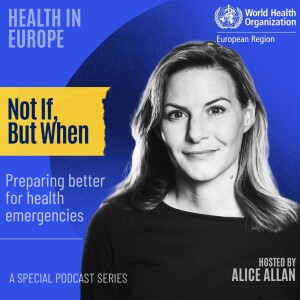
Tuesday Aug 20, 2024
Tuesday Aug 20, 2024
In tropical and subtropical countries, the virus causing dengue is spiking. Close to an historic high of over 6 million cases and more than 7,000 dengue-related deaths were reported in over 80 countries and territories in 2023. Most places in Europe remain too cool to favour the mosquito or the virus, but imported dengue cases have been rising in the European region and the impact of climate change appears to be shifting the picture.
To find out more about dengue and the family of viruses it belongs to, called arboviruses, Alice Allan speaks to Marc-Alain Widdowson, high threat pathogens technical lead at the WHO Regional Office for Europe and medical entomologist Luca Facchinelli. To learn more about Italy’s work on dengue prevention and communication, she speaks to Flavia Riccardo, an epidemiologist in the Infectious Disease Department of the Italian National Institute of Health, and her colleague from the Institute’s press office, Pier David Malloni.
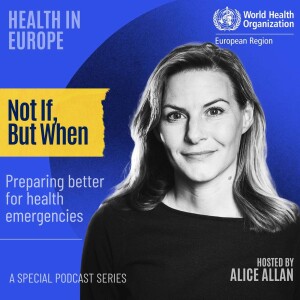
Friday Aug 02, 2024
Friday Aug 02, 2024
The first of the three influenza pandemics that occurred in the 20th century is estimated to have killed over 50 million people. Based on scientific advances, what do we know about the 1918-20 pandemic? What lessons does it teach about preventing pandemics and containing outbreaks when they do occur?Richard Pebody, director clinical and emerging infections of the UKs health security agency, explores the deadly 1918-20 pandemic. Thorsten Wolff, head of the Division for Influenza and other Respiratory Viruses, talks us through the scientific discoveries that helped to explain the virus that caused the 1918-20 pandemic, and the ongoing work of the National Influenza centre in Berlin. Nicola Lewis, Director of the Worldwide Centre for Influenza at the Francis Crick Institute, UK, explains their work to monitor seasonal flu and pick up changes in flu strains that could have pandemic potential.
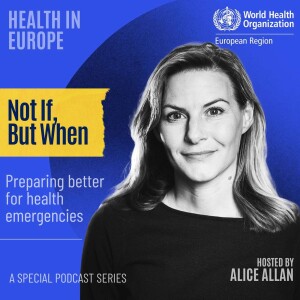
Tuesday Jun 25, 2024
Tuesday Jun 25, 2024
The 2022 mpox outbreak has taught public health authorities a lot about the value of working with communities on important areas like testing, vaccination, and risk communication. Lessons that can be applied to other disease outbreaks.Mpox is back in the news; there are sporadic clusters of cases in our region, and, in Central and West Africa, two strains of the virus continue to cause suffering and death. In this episode, we speak to Rosamund Lewis, Emergency Manager & Technical Lead for the global mpox response at WHO Headquarters, about the current situation. Cristiana Salvi, who leads the Risk Communication and Community Engagement unit for WHO regional Office for Europe explains the importance of community insights in the mpox response. We also hear from epidemiologist Mateo Prochaska Nunez on the combination of factors that brought the outbreak under control and the measures needed to keep the virus in check.
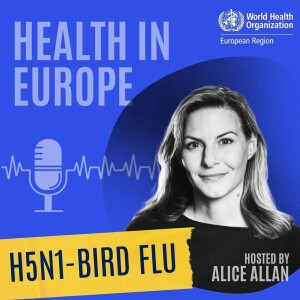
Friday May 24, 2024
Friday May 24, 2024
In this episode, we are putting a special focus on the H5N1 bird flu. We explore the ongoing efforts to prepare for future pandemics by speaking with experts like Peter Sousa Hoejskov, who explains the constant risk of zoonotic diseases jumping from animals to humans, and Maria van Kerkhove, who emphasizes the importance of global surveillance and preparedness in the face of potential influenza pandemics. The discussion sheds light on how close human-animal interactions, even in regions like Europe, keep the threat of these diseases ever-present.The insightful contributions from leading scientists provide a comprehensive understanding of why we must remain vigilant and proactive. Tune in to Health in Europe with host Alice Allan to discover what’s being done to protect us all from the next pandemic - not if but when.(Interviews for this podcast were recorded in early May 2024)
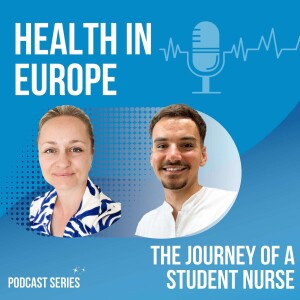
Thursday May 16, 2024
Thursday May 16, 2024
We turn our attention to the world of nursing through the compelling lens of Stefanie Fernandes and Francisco Ferraz. Francisco, a passionate third-year nursing student from Portugal, brings us into the heart of his journey—navigating the intricate balance of emotional connections and the systemic challenges within healthcare. From his night shifts in the pediatric intensive care unit to the poignant stories that shape his vocation, Francisco's experiences offer a raw and insightful look at the realities of nursing. This episode not only highlights the indispensable role of nurses but also underscores the urgent need for systemic reforms to better support these healthcare heroes. Join us as we dive into the essence of what it means to care, to endure, and to strive for change in a profession that is both profoundly rewarding and undeniably demanding.Find out more about nursing: https://www.who.int/europe/health-topics/nursing






